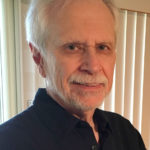PUBLISHED NOVEMBER/DECEMBER 2018
by Anthony Pomes, Vice President of Marketing/Rights/PR, Square One Publishers --

Anthony Pomes
Square One Publishers President Rudy Shur successfully built a strong independent publishing company through buying other small independents and bringing on new authors.
Square One Publishers finds itself at an interesting moment in its 18-year history. Following the acquisition this past January of Rodale Inc. by Hearst Communications-who then sold off all Rodale Books' health titles to Penguin Random House (PRH)—Square One now stands as the biggest independently owned publisher in the United States to maintain shared focus on both traditional and complementary health books. With more than 350 active titles in print, Square One's president, Rudy Shur, and his devoted team of full- and part-time employees are poised to take the company's success to the next level in the subject areas of health and fitness.
"I found it ironic," says Shur about when he learned that the Rodale health books were being picked up by Penguin Random House. Ironic, perhaps, because he saw the 1,000-plus health titles that he signed over 23 years as publisher of his first company, Avery, be sold off to Penguin back in the summer of 1999. "That was before Penguin had joined up with Random House, when it was still its own entity. Now that PRH exists and the Rodale family sold all its assets to Hearst, it looks like we're the last self-owned traditional and alternative health publisher left standing. Not that we mind, of course."

Square One's "How to Pray" by Helene Ciaravino
Though he was blocked by a noncompete clause in Penguin's Avery acquisition deal from publishing health books for three years, Shur swiftly brought his new venture to the forefront of indie book publishing when he started Square One back in 2000. Leading the list was an acclaimed American Sign Language (ASL) title
Talking With Your Hands, Listening With Your Eyes that remains the No. 1 top-selling ASL reference book within high schools and colleges, a religion title—
How to Pray, which won the
IBPA Benjamin Franklin Award for Best Religion title in 2002—and a pop culture trivia book,
Joe Franklin's Great Entertainment Trivia, that enjoyed a nontraditional sale of 25,000 copies on its first print run.
As soon as he could, though, Shur went right back to his biggest passion as a publisher—health and fitness topics, both from traditional and complementary perspectives. He started small, with a small health book called
The Acid-Alkaline Food Guide—and the title, though sized at a mass-market format, became one of the company's biggest health titles with more than 250,000 copies sold to date. "Those little baby health books of ours really seemed to stick," recalls Shur, who then brought out an additional 10 titles in what was called the "Square One Health Guide" series. A lead title in that format,
The Magnesium Solution for High Blood Pressure, remains in the company's top 10 list of strong-selling backlist health titles.

"What You Must know About Vitamins, Minerals, Herbs & More" by Dr. Pamela Wartian-Smith
In addition, Shur reconnected to various health authors with whom he had worked during the Avery years—such as Dr. Nancy Appleton, whose new book for Square One titled
Suicide by Sugar made a big splash at home and abroad where it has been translated into eight other languages—and forged new and increasingly profitable alliances with physicians/authors such as Dr. Pamela Wartian-Smith (
What You Must Know About Vitamins, Minerals, Herbs & More, among various others) and Dr. Jeffrey Anshel (
Smart Medicine for Your Eyes) whose own respective platforms continue to do much to bring forth steady and ever-increasing sales on their books in addition to what continues to earn within the book trade.
At the same time that he has continued to seek out and sign a myriad of health-focused titles—"all of which provide interesting stories and perspectives that deserve to be seen, heard about, and read in a democratic society," he notes—Shur has also picked key moments in Square One's development when he would look to pick up and incorporate titles from other similarly sized health publishers into the Square One line. To date, Square One has picked up titles from companies like: Vital Health Publishing and Professional Books Inc. (PBI) in 2007; the book program of InnoVision Health Media in 2009; Safe Goods Publishing in 2010; and, though this most recent acquisition is focused more on topics of science and environmental conservation, Shur also acquired Ocean Publishing in 2016.
Within the trade, Square One's consistent growth as an independent small book publisher was recognized and lauded in
Publishers Weekly for six years in a row as one of the fastest-growing publishing houses in the United States. In 2012, Shur felt the time was right for Square One to remove itself from the annual list of well-performing small publishers so that other houses were also given the chance to shine in the light of their peers. "It was gratifying for us to stand up and be counted like that within the industry," Shur says, "but we felt the point of our success and relevance had been made, and it was time for us to really dig in and sharpen our focus even more closely upon the world of health and fitness book publishing."
Six years later, Shur and his fellow Squares have worked hard to bring a variety of top-quality and often crucial health titles to the forefront of mainstream medicine—and culture. Over these past years, there have been significant new titles on topics such as Alzheimer's disease; processed foods; natural healers: and the increased legalization throughout the US of medical marijuana and hemp CBD oil products.
"My father spent his life working in a bakery," Shur says, "while I've spent most of mine working in a
bookery. I like the idea that my company and I have worked hard to serve people, just as my father did—but it pleases me just a little more to know that what we have to offer at Square One can help people be happy
and healthy."
An Interview With Square One Publishers President Rudy Shur
interview by
Alexa Schlosser, Managing Editor,
IBPA Independent magazine --

Rudy Shur
What is your background?
I have been in book publishing since 1970, when I first landed a job as a college textbook traveler for a college textbook company. Three years later, I was offered a job at another college textbook publisher as both a traveler and associate editor. I took it. Four years later, I decided that I would start my own college publishing house. Along with my best friend, Lee Solomon, and my then-still-in-college brother-in-law, Ken Rajman, we started Avery Publishing Group. Over the 26 years we were in business, we specialized in adult nonfiction books. While we started off as a college textbook company, we also moved into various other niche marketplaces such as childbirth, military history, and, eventually, health. By the time Penguin Putnam purchased our company in 1999, Avery had become the largest and most widely distributed health book publisher in the country.
Why did you decide to focus on health books?
A good friend of mine had been diagnosed with cancer of the jaw. As time went on, I witnessed how much suffering he would go through as he went from one operation to another, one chemo treatment to the next. His death had a pronounced effect on me, and I thought there had to have been a better and more humane way to treat this disease.
As fate would have it, a printer told me about a book he had been printing for a place up in Boston called The Hippocrates Health Institute. While the book was poorly put together, it still seemed to be reprinting with some regularity. He gave me the name of the director, and I made an appointment to see him up at their facility. The institute was located in a beautiful, four-story building located on Exeter Street off of Commonwealth Avenue. He showed me around and explained what they were doing. People with serious health conditions would come from all over the country to learn about raw vegetarianism and the power of wheatgrass. He then showed me a few of their publications they had self-published, and I knew we could do a much better job at publishing them in a more professional manner.
When I can home that evening, I actually decided to go on a raw vegetarian diet. This was a big surprise to my wife, who knew how bad my eating habits were. After three days of being on the diet, I woke up to discover that my decades-long sinus problems that would often block off my breathing in the morning had disappeared. Without using any medications or medical procedure, I had cured myself of a problem that I had suffered with for much of my life up to that point. The idea that we all have the ability to be our own doctor changed the course of my editorial direction. After the Hippocates Institute, I sought out the leading pioneers in the areas of natural health and offered to be their publisher. It was a wonderful journey.
What did you do during those three years of the non-compete clause?
Since health was not the only area I published books on with Avery, I continued to publish adult nonfiction books for niche markets. This included military history, pregnancy, and childbirth—many of the areas with which I was already familiar. I also expanded into other areas like how-to, finance, and trivia books.
What's it like being the last self-owned traditional and alternative health publisher left?
While I don't believe I am the last, it is interesting to see how Amazon and self-published titles have changed the landscape of book publishing. Today, there are many new alternative health books being brought out by self-publishers, and many of those books are not vetted for accuracy or carefully edited. If you have a health problem and you see a book on the internet that seems to address your issue, you have to be very careful about any information that a title has to offer.
My editorial operation has never changed from the way I began as a college textbook company. We work very hard to make our books consistent, accessible, and factually correct. It sometimes takes us a little longer than other publishers to turn out a book. When they come out, however, they are the type of book you want to have by your bedside.
Does that create extra pressure?
There is always a level of pressure to do things correctly and to live up to your authors' expectations of you as their publisher. Since I truly love what I do, though, it's never really an issue. It's pretty simple, actually. The goal of this company is to turn out good books that can have an impact on people's lives. And that's what we do.
What advice do you have to other indies looking to replicate your kind of success?
Know your subject as well as you can know it. Know your marketplaces. Always make sure you have the very best people working for you—and don't focus on becoming rich; focus on the quality of your products.
What independent publisher do you look up to?
When I began in publishing, I studied the titles of Keats Publishing, Tarcher, and Ten Speed Press. They were the type of houses that I wanted Avery to become. Over time, I became good friends with Nathan Keats—the founder of Keats Publishing—and learned a great deal from him, for which I have always been grateful. The individuals behind these companies had both vision and marketing sense. Over time, however, all these individuals have passed away and their companies have been purchased by one of the major conglomerate houses.
Is there a moment over the course of 18 years at Square One that stands out to you as a particular independent publisher moment?
The first moment was when I decided to start Square One Publishers. Eight of my old company's managers decided to stay with me under the new company. That was very gratifying. Next was being selected six years in a row as one of the fastest-growing publishers in the US by
Publishers Weekly. And three would be that moment every time I look at our newest catalog and see there what we have accomplished with the newest range of titles that we have brought out.
What's next for Square One?
First, to continue the editorial path we now follow; and second, to not be afraid to always look around the corner for something different.
Anthony Pomes is the vice president of marketing/rights/PR at Square One Publishers Inc. He worked previously as publicity manager for Penguin Putnam Books for Young Readers, and has continued to work steadily as a freelance writer/editor and frequent ghostwriter for more than two decades.
Alexa Schlosser is the managing editor of IBPA Independent
. Do you have an interesting self-publishing story? Contact her at alexa@ibpa-online.org.
For more tips for independent publishers, check out this
IBPA Independent article, "
Guidance on Growth by Acquisition."